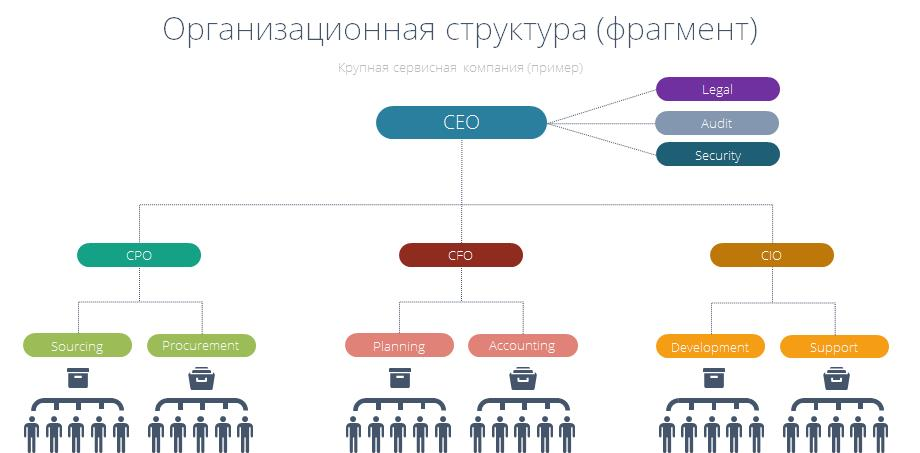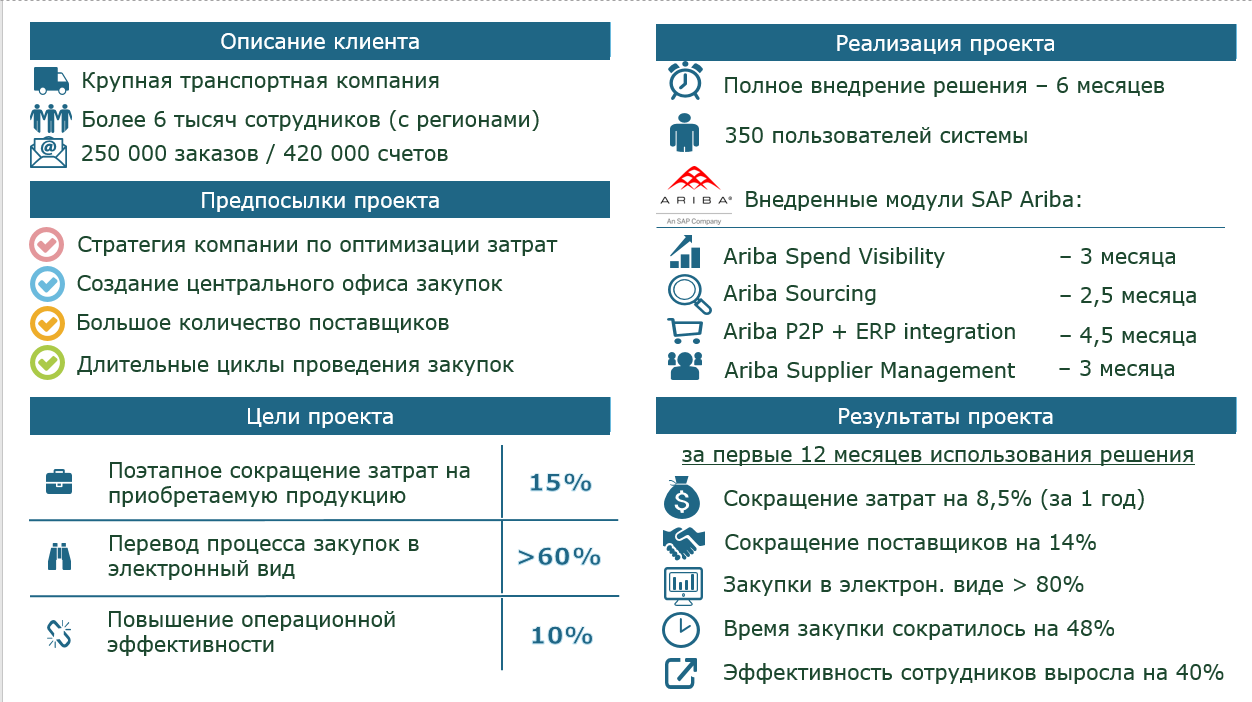Reaching Heaven: Managing Cloud Purchases with SAP Ariba
Today we want to talk about the SAP Ariba family of solutions that offer interesting technologies to develop the process of interaction between companies in the field of procurement. In this post we will touch on the principles of a relatively new solution for Russia on the SAP platform and talk about a couple of already implemented projects with ready-made results.
 A source
A source
In short, in 2012, Ariba acquired SAP. And for good reason. At the core of the Ariba product family is the Ariba Network, a global business network that demonstrates high growth momentum and today has “taken root” in Russia. More than 2.5 million companies are registered with the Ariba Network, and $ 50 billion in payments passes through it every year. Agree, a curious asset to work internationally? However, we, the specialists of NORBIT , as a Russian integrator who belongs to the LANIT group and makes a great contribution to its first positions in the authoritative ratings of the IT services market (by the way, here are the results of the latest IDC research), it was most interesting to understand what SAP Ariba can be useful in our country.
 Source
Source
In Russia, the procurement sphere is one of the most regulated in the world. At the legislative level, there are constantly changes and additions to the regulatory framework that relate to government procurement and procurement of companies with state participation. Therefore, it is necessary to constantly update business processes and change interaction with internal and external information systems. As you understand, this requires significant labor and financial costs.
The costs are significant. After analyzing the published plans of various organizations for the development and maintenance of procurement processes, we came to the conclusion that large companies spend from a few million to several tens of millions of rubles a year on it, and some expenses exceed 100 million rubles to support procurement activities. And this is not counting the additional costs of maintaining a staff of specialists providing support.
But the biggest problem is that precious time is wasted, and prompt response to a changing situation becomes impossible. As a result, companies are held hostage to complex budgeting cycles, vendor selection procedures, and documentation requirements (GOST), even if the individual solution functions and optimizations are refined. The current emphasis on maintaining the operational contour in many ways makes it impossible to concentrate on solving other pressing problems, and in this context, SAP Ariba can be a very useful solution for changing the “rules of the game”.

Dynamics of business processes in the system allows for the modernization of the procurement procedure, including solving the actual needs of the procurement department:
In Russian companies, paper circulation continues to prevail, at best, intermediate documents are sent by mail, and the final documents are scanned and placed in the document management system.
Because of this, there is a need to develop or implement a ready-made single tool for procurement management and its integration with various IT systems of the company - from ERP and accounting to warehouse and logistics. And it often turns out that you need to change the entire chain of data transfer and approvals. After all, if you simply present a typical procurement process, it will look like this:

As you can see, work with documentation repeatedly goes from one department to another, several coordination cycles are carried out, the area of responsibility is not always formalized, and an attempt to implement an IT solution that combines all the processes associated with procurement in its current form becomes a real hell. It would be much easier to create a scheme that does not require multiple transfer of documents to each other and a lot of approvals - so that the IT tool itself regulates all processes and helps to conduct procurement with greater efficiency.

The same problem arises for Russian companies when interacting with counterparties. For this, various solutions for organizing interaction with suppliers are usually developed, and then over the years: integration with electronic platforms, development of supplier portals, connection to market places, interaction with electronic information exchange operators, and so on. Instead, the use of the SAP Ariba Network eliminates intermediaries, reduces the cost of integration and maintenance of complex processes of interaction with suppliers, as well as form a single information space for the interaction of all process participants, both internal and external.
 Source
Source
SAP Ariba contains templates that have already managed to run into other companies. The system is constantly enriched by new approaches to procurement for companies of various sizes and industry sector, which are retained by participants as sets of business rules. In other words, SAP Ariba allows you to conduct procurement according to existing regulations, but taking into account the positive experience of procurement by other organizations, as well as automate the processes of tendering and invoicing. As an example of the already established procurement practices, below is a typical structure of a company with a centralized procurement management system based on Ariba.

Plus, there is no need to integrate anything here - all interfaces are already implemented, and coordination processes are supported within the system. For example, one fairly large financial group faced problems in contracting. Historically, the organization has developed the practice of different approaches to working with contracts. As a result, their number reached 240 types, and the cycle of concluding each new agreement began to take several months. At the same time, the company currently has more than 6,000 clients and over 25,000 active contracts requiring administration.
Based on SAP Ariba, we managed to gradually move to standard contracts, as well as create a single registry and transfer all contract data to it. In fact, only one solution module was used to resolve the issue - SAP Ariba Contract Management. Together with the formation of model contracts and data migration, its implementation took only 5 months. A year later, 55% of the contracts in the company were standardized, 6 universal approval schemes were created for them, and the time for concluding contracts decreased on average by 32%.

Another case in point is a large transport company with more than 6,000 employees, including regional offices. As the organization grows, the lack of a unified digital procurement scheme has led to an increase in the cost of servicing orders and invoices (of which there were about 250,000 and 420,000 per year). To solve the problems of this customer, four components have already been used - Ariba Supplier Management, Ariba P2P with integration into the ERP system, Ariba Sourcing and Ariba Spend Visibility.

The implementation of the entire system took 6 months, during which the company received a ready-made solution for electronic procurement and optimization of work with counterparties. In total, 350 users were connected to the system, and the results were as follows: costs decreased by 8.5% in the first year of operation, the number of suppliers decreased by 14%, the purchase time decreased by 48%, and the efficiency of employees increased by 40%.
 Source
Source
If we talk in detail about the implemented modules, they solve the following tasks at the customer.
Following the results of projects already implemented and being implemented, we found an interesting feature of SAP Ariba. This system allows you to quickly optimize the processes of procurement management, while offering a number of additional "buns" that could not be introduced by companies, but are very useful in practice.

First, Ariba opens access to international procurement processes and allows suppliers to offer their services to companies in regions that they have not even thought about. In turn, Russian companies may find new, but at the same time already proven suppliers, for example, in China, and conclude more lucrative contracts.
Secondly, Ariba allows you to assess the risks that may arise due to problems with suppliers. The intelligent system analyzes data from more than a hundred thousand sources and informs you that one of your suppliers has encountered a problem. In particular, you can instantly stop purchases from him so that a serious problem does not affect your company.
Third, automatic contract preparation tools help ensure compliance with regulatory requirements depending on the region in which the company operates, and also issue invoices in accordance with the rules of local tax authorities. The system of notifications and reminders already created by the developers informs about the necessary actions of all the participants in the coordination and auditors, reducing the time required for the implementation of bureaucratic procedures.
The fourth thing we noted is that this is a ready process of a phased transition from paper documentation to electronic contracts, and then to the introduction of so-called “intellectual contracts”. At the same time, it is possible to work with a variety of electronic signature service providers, including Russian ones, in full compliance with the requirements of the FSB and other regulators.
Finally, the fifth plus is the ability to extend the functions of Ariba based on the SAP Cloud Platform. Thanks to the SAP cloud platform, the system can be adapted to almost any specificity, and without becoming dependent on the particular company that is implementing the revision. And a business-oriented process administration system already built into the solution allows you to customize and implement business processes without the involvement of IT specialists.
At the same time, given that SAP Ariba solutions have recently been introduced in the Russian market, there are areas in which the functionality of SAP Ariba may require additional adaptation in Russian companies to the requirements of regulatory documents. The system will have to be refined when organizing a legally significant document circulation with regard to the requirements of the Federal Law "On Electronic Digital Signature" and connecting to the operator of the exchange of electronic documents. Also, Ariba will have to “screw up” services for collecting information on suppliers that take into account Russian practice (data from the Incorporation, information from the Federal Tax Service, registries of unscrupulous suppliers, etc.).
However, there were quite a lot of interesting features of the system, if a respected Habr audience wants to know how the processes of risk management, information transfer, integration and other architecture elements are successful in the world and a fairly new solution for Russia, we will tell about them in the following posts

In short, in 2012, Ariba acquired SAP. And for good reason. At the core of the Ariba product family is the Ariba Network, a global business network that demonstrates high growth momentum and today has “taken root” in Russia. More than 2.5 million companies are registered with the Ariba Network, and $ 50 billion in payments passes through it every year. Agree, a curious asset to work internationally? However, we, the specialists of NORBIT , as a Russian integrator who belongs to the LANIT group and makes a great contribution to its first positions in the authoritative ratings of the IT services market (by the way, here are the results of the latest IDC research), it was most interesting to understand what SAP Ariba can be useful in our country.
Procurement problem

In Russia, the procurement sphere is one of the most regulated in the world. At the legislative level, there are constantly changes and additions to the regulatory framework that relate to government procurement and procurement of companies with state participation. Therefore, it is necessary to constantly update business processes and change interaction with internal and external information systems. As you understand, this requires significant labor and financial costs.
The costs are significant. After analyzing the published plans of various organizations for the development and maintenance of procurement processes, we came to the conclusion that large companies spend from a few million to several tens of millions of rubles a year on it, and some expenses exceed 100 million rubles to support procurement activities. And this is not counting the additional costs of maintaining a staff of specialists providing support.
Main cost areas:
- развитие и доработка систем, автоматизирующих закупочную деятельность;
- развитие или доработка собственных электронных площадок;
- закупка различных услуг и сервисов, необходимых для организации закупочной деятельности (сервисы проверки поставщиков, взаимодействие со сторонними электронными площадками, взаимодействие с операторами электронного обмена документами, сервисы агрегаторов информации о закупках и др.);
- привлечение специализированных организаций для проведения закупок;
- обучение собственного персонала в области закупочной деятельности.
But the biggest problem is that precious time is wasted, and prompt response to a changing situation becomes impossible. As a result, companies are held hostage to complex budgeting cycles, vendor selection procedures, and documentation requirements (GOST), even if the individual solution functions and optimizations are refined. The current emphasis on maintaining the operational contour in many ways makes it impossible to concentrate on solving other pressing problems, and in this context, SAP Ariba can be a very useful solution for changing the “rules of the game”.

Dynamics of business processes in the system allows for the modernization of the procurement procedure, including solving the actual needs of the procurement department:
- transition to a unified procurement strategy,
- cost reduction through automation,
- Maintain the relevance and accuracy of data
- search and fast qualification of suppliers,
- increase operational efficiency
- training in the workplace.
In Russian companies, paper circulation continues to prevail, at best, intermediate documents are sent by mail, and the final documents are scanned and placed in the document management system.
Because of this, there is a need to develop or implement a ready-made single tool for procurement management and its integration with various IT systems of the company - from ERP and accounting to warehouse and logistics. And it often turns out that you need to change the entire chain of data transfer and approvals. After all, if you simply present a typical procurement process, it will look like this:

As you can see, work with documentation repeatedly goes from one department to another, several coordination cycles are carried out, the area of responsibility is not always formalized, and an attempt to implement an IT solution that combines all the processes associated with procurement in its current form becomes a real hell. It would be much easier to create a scheme that does not require multiple transfer of documents to each other and a lot of approvals - so that the IT tool itself regulates all processes and helps to conduct procurement with greater efficiency.

The same problem arises for Russian companies when interacting with counterparties. For this, various solutions for organizing interaction with suppliers are usually developed, and then over the years: integration with electronic platforms, development of supplier portals, connection to market places, interaction with electronic information exchange operators, and so on. Instead, the use of the SAP Ariba Network eliminates intermediaries, reduces the cost of integration and maintenance of complex processes of interaction with suppliers, as well as form a single information space for the interaction of all process participants, both internal and external.
Should I reinvent the wheel?

SAP Ariba contains templates that have already managed to run into other companies. The system is constantly enriched by new approaches to procurement for companies of various sizes and industry sector, which are retained by participants as sets of business rules. In other words, SAP Ariba allows you to conduct procurement according to existing regulations, but taking into account the positive experience of procurement by other organizations, as well as automate the processes of tendering and invoicing. As an example of the already established procurement practices, below is a typical structure of a company with a centralized procurement management system based on Ariba.

Plus, there is no need to integrate anything here - all interfaces are already implemented, and coordination processes are supported within the system. For example, one fairly large financial group faced problems in contracting. Historically, the organization has developed the practice of different approaches to working with contracts. As a result, their number reached 240 types, and the cycle of concluding each new agreement began to take several months. At the same time, the company currently has more than 6,000 clients and over 25,000 active contracts requiring administration.
Based on SAP Ariba, we managed to gradually move to standard contracts, as well as create a single registry and transfer all contract data to it. In fact, only one solution module was used to resolve the issue - SAP Ariba Contract Management. Together with the formation of model contracts and data migration, its implementation took only 5 months. A year later, 55% of the contracts in the company were standardized, 6 universal approval schemes were created for them, and the time for concluding contracts decreased on average by 32%.

Another case in point is a large transport company with more than 6,000 employees, including regional offices. As the organization grows, the lack of a unified digital procurement scheme has led to an increase in the cost of servicing orders and invoices (of which there were about 250,000 and 420,000 per year). To solve the problems of this customer, four components have already been used - Ariba Supplier Management, Ariba P2P with integration into the ERP system, Ariba Sourcing and Ariba Spend Visibility.

The implementation of the entire system took 6 months, during which the company received a ready-made solution for electronic procurement and optimization of work with counterparties. In total, 350 users were connected to the system, and the results were as follows: costs decreased by 8.5% in the first year of operation, the number of suppliers decreased by 14%, the purchase time decreased by 48%, and the efficiency of employees increased by 40%.

If we talk in detail about the implemented modules, they solve the following tasks at the customer.
- Ariba Supplier Management allows you to manage customer relationships and was implemented in 3 months.
- Ariba P2P, which provides direct interaction with counterparties via the Ariba Network, has been implemented in 4.5 months, including integration with the ERP system used by the customer.
- Ariba Sourcing is a solution that helps to find new suppliers, and its implementation took 2.5 months.
- Analytical module Spend Visibility just became a key element to reduce costs, as it allowed to track all the costs of the company in relation to the interaction with various suppliers. Its integration into the company's infrastructure took 3 months.
Interesting potential
Following the results of projects already implemented and being implemented, we found an interesting feature of SAP Ariba. This system allows you to quickly optimize the processes of procurement management, while offering a number of additional "buns" that could not be introduced by companies, but are very useful in practice.

First, Ariba opens access to international procurement processes and allows suppliers to offer their services to companies in regions that they have not even thought about. In turn, Russian companies may find new, but at the same time already proven suppliers, for example, in China, and conclude more lucrative contracts.
Secondly, Ariba allows you to assess the risks that may arise due to problems with suppliers. The intelligent system analyzes data from more than a hundred thousand sources and informs you that one of your suppliers has encountered a problem. In particular, you can instantly stop purchases from him so that a serious problem does not affect your company.
Third, automatic contract preparation tools help ensure compliance with regulatory requirements depending on the region in which the company operates, and also issue invoices in accordance with the rules of local tax authorities. The system of notifications and reminders already created by the developers informs about the necessary actions of all the participants in the coordination and auditors, reducing the time required for the implementation of bureaucratic procedures.
The fourth thing we noted is that this is a ready process of a phased transition from paper documentation to electronic contracts, and then to the introduction of so-called “intellectual contracts”. At the same time, it is possible to work with a variety of electronic signature service providers, including Russian ones, in full compliance with the requirements of the FSB and other regulators.
Finally, the fifth plus is the ability to extend the functions of Ariba based on the SAP Cloud Platform. Thanks to the SAP cloud platform, the system can be adapted to almost any specificity, and without becoming dependent on the particular company that is implementing the revision. And a business-oriented process administration system already built into the solution allows you to customize and implement business processes without the involvement of IT specialists.
At the same time, given that SAP Ariba solutions have recently been introduced in the Russian market, there are areas in which the functionality of SAP Ariba may require additional adaptation in Russian companies to the requirements of regulatory documents. The system will have to be refined when organizing a legally significant document circulation with regard to the requirements of the Federal Law "On Electronic Digital Signature" and connecting to the operator of the exchange of electronic documents. Also, Ariba will have to “screw up” services for collecting information on suppliers that take into account Russian practice (data from the Incorporation, information from the Federal Tax Service, registries of unscrupulous suppliers, etc.).
However, there were quite a lot of interesting features of the system, if a respected Habr audience wants to know how the processes of risk management, information transfer, integration and other architecture elements are successful in the world and a fairly new solution for Russia, we will tell about them in the following posts
Our company open vacancies, join!
Only registered users can participate in the survey. Sign in , please.
